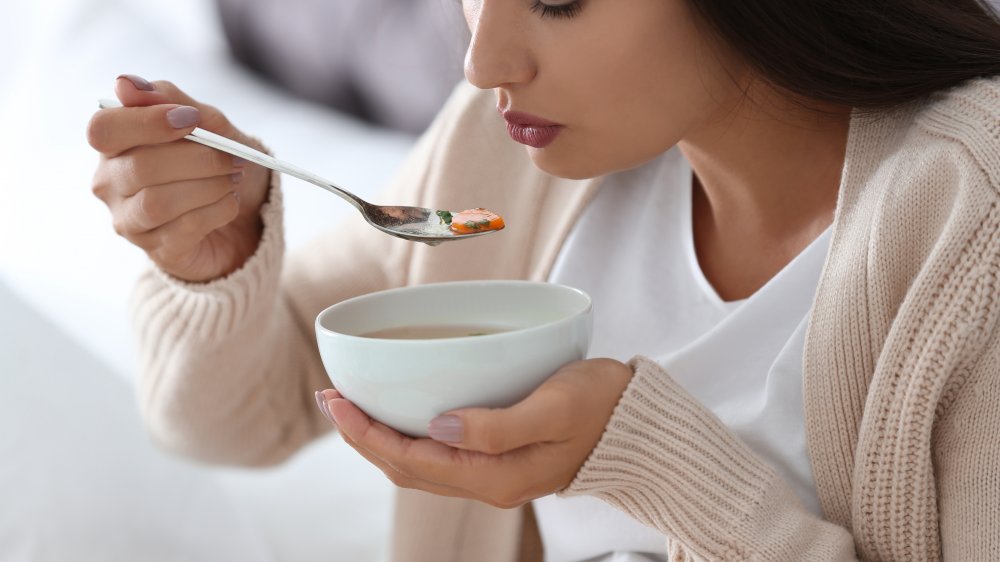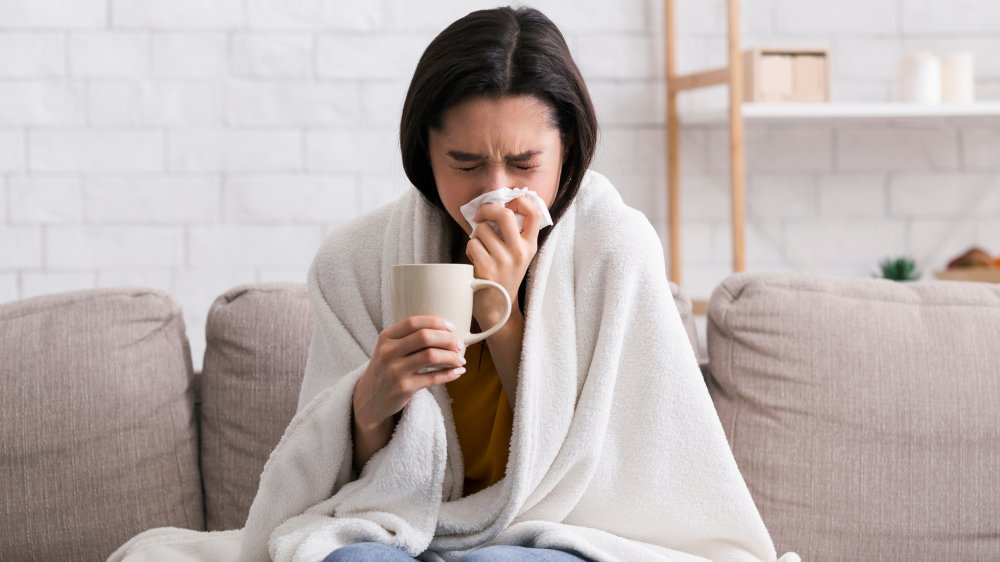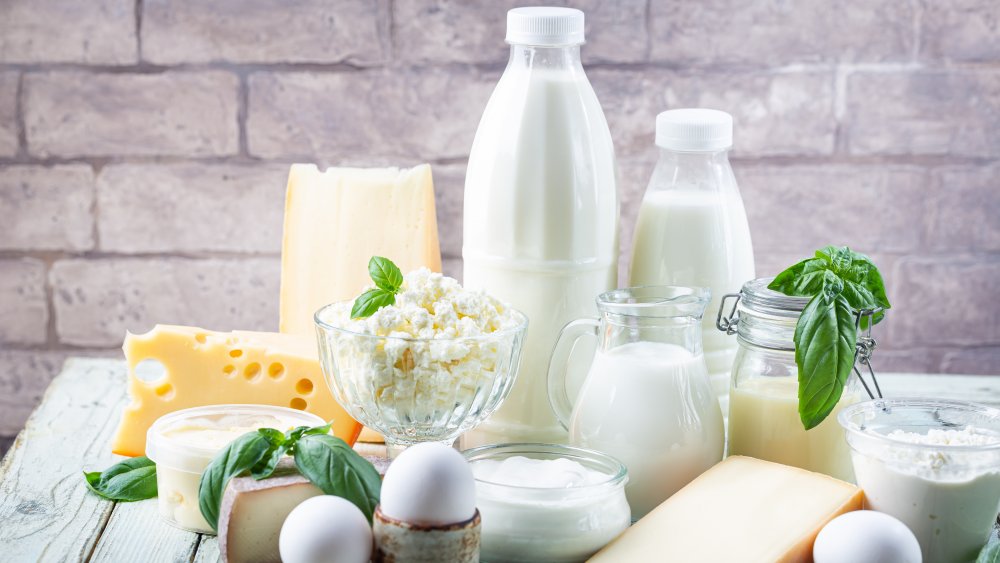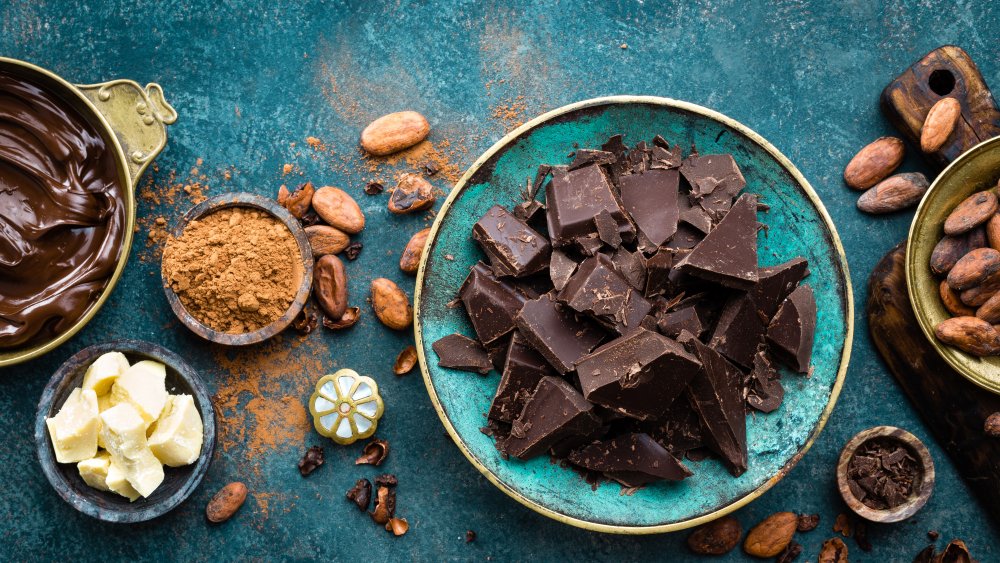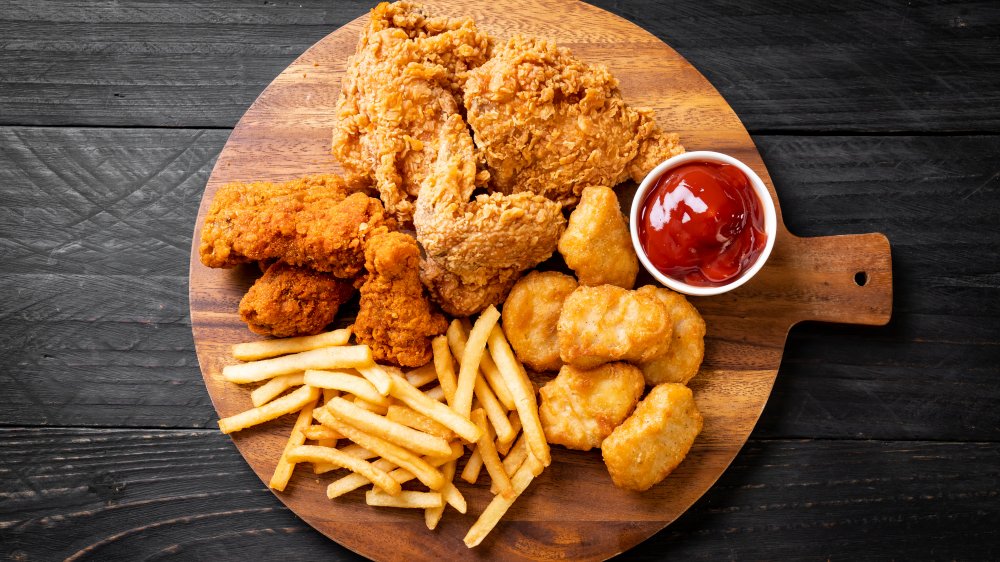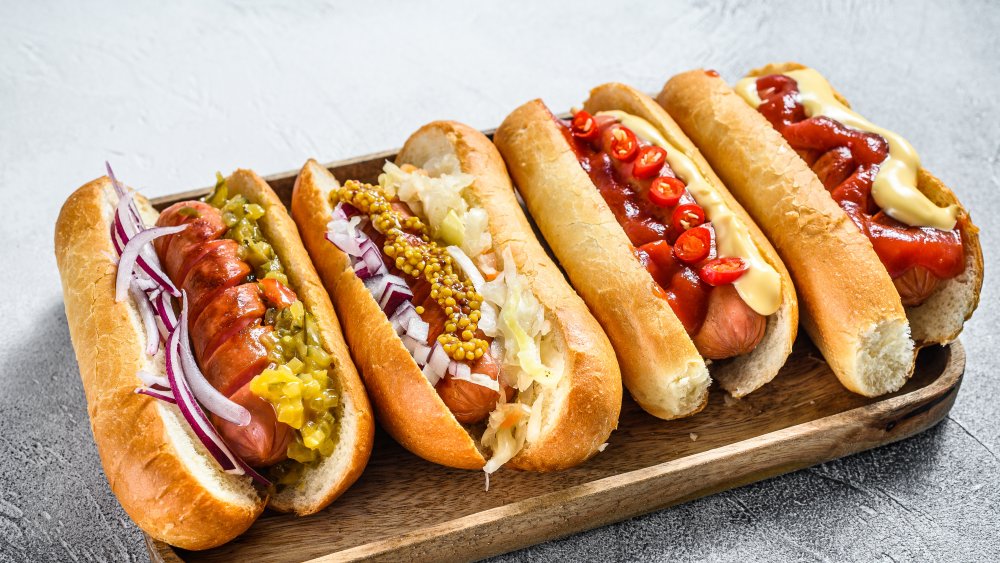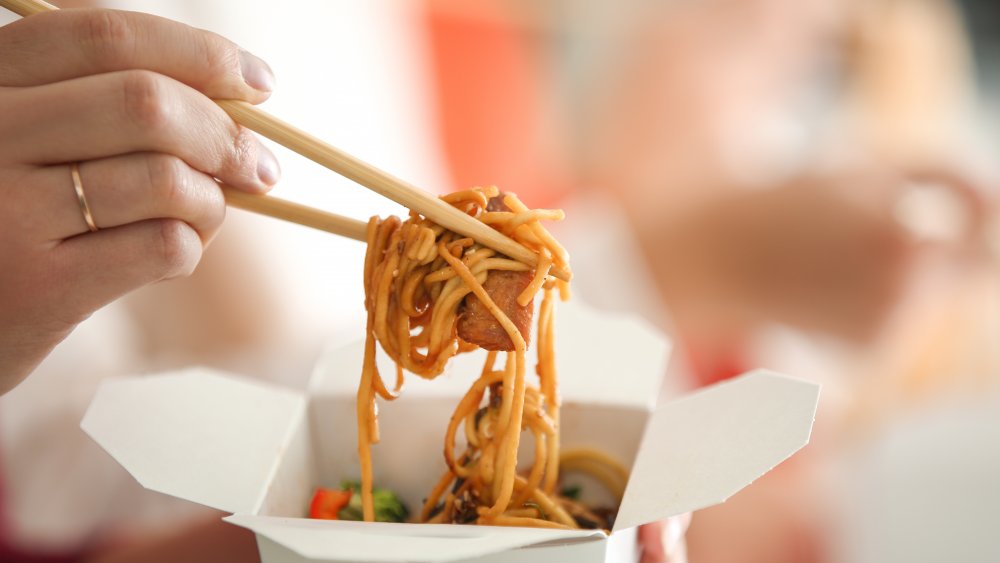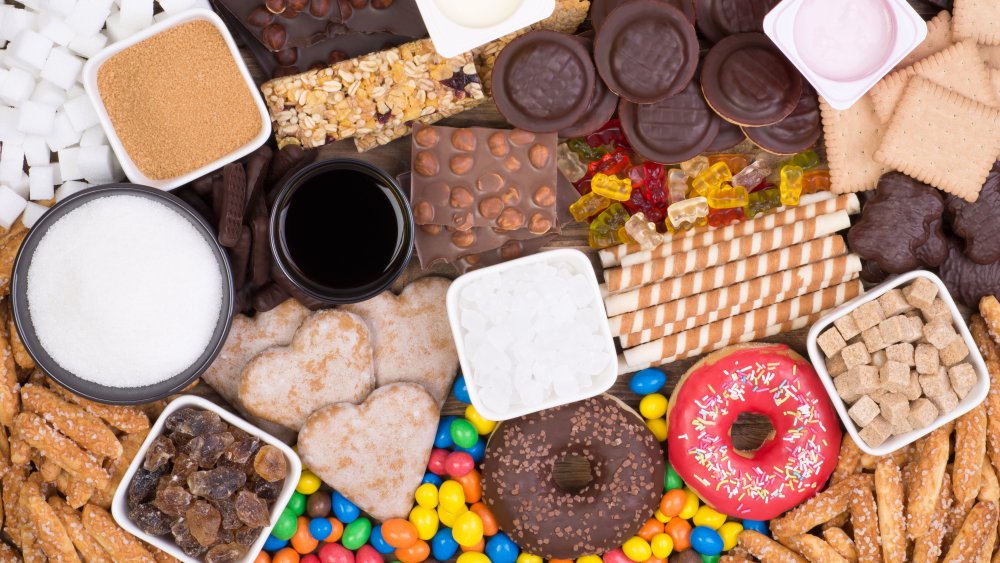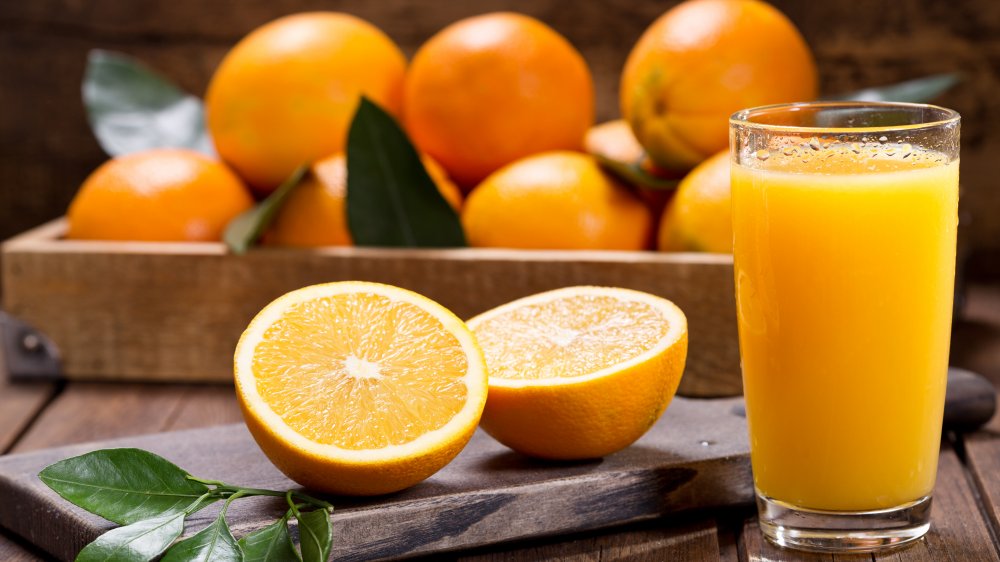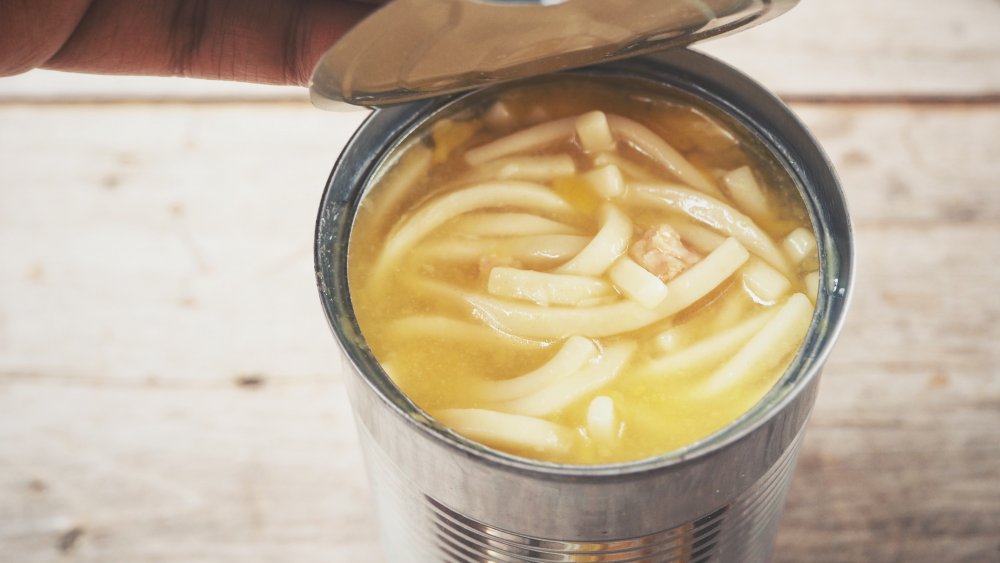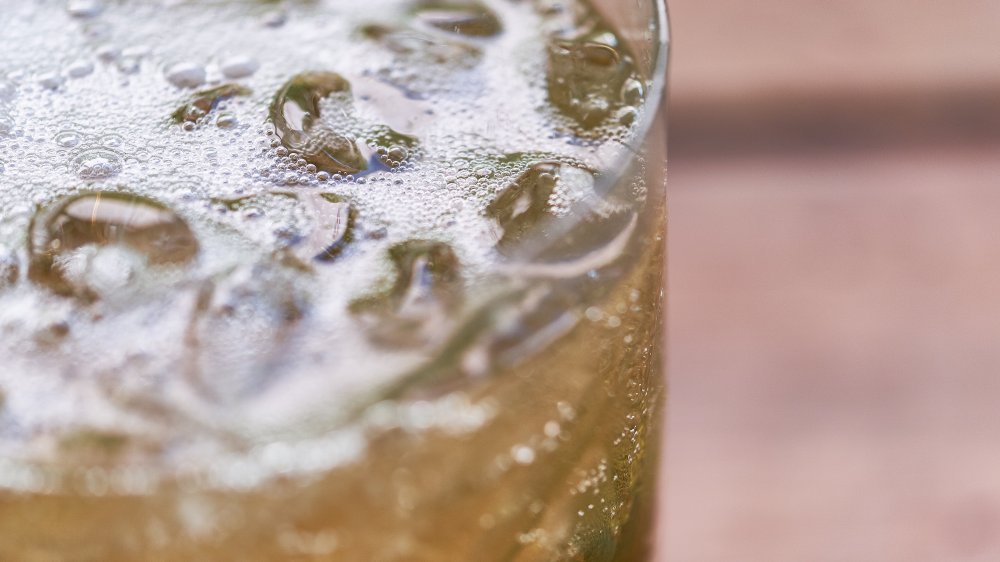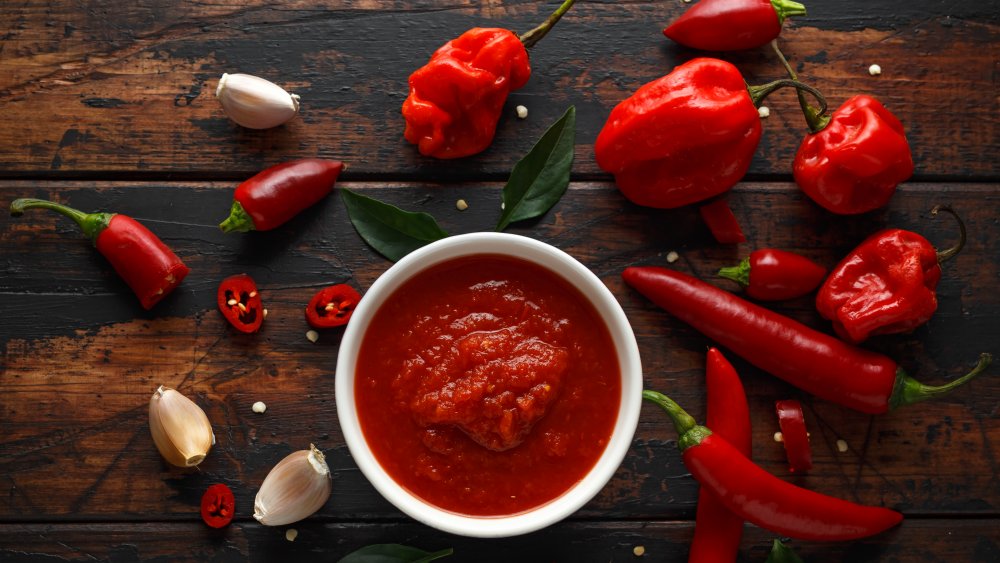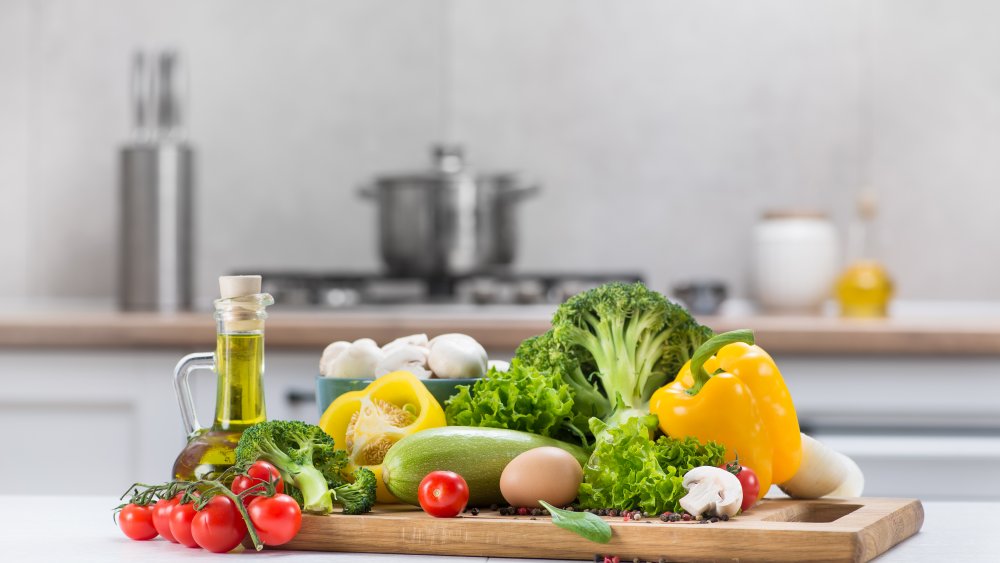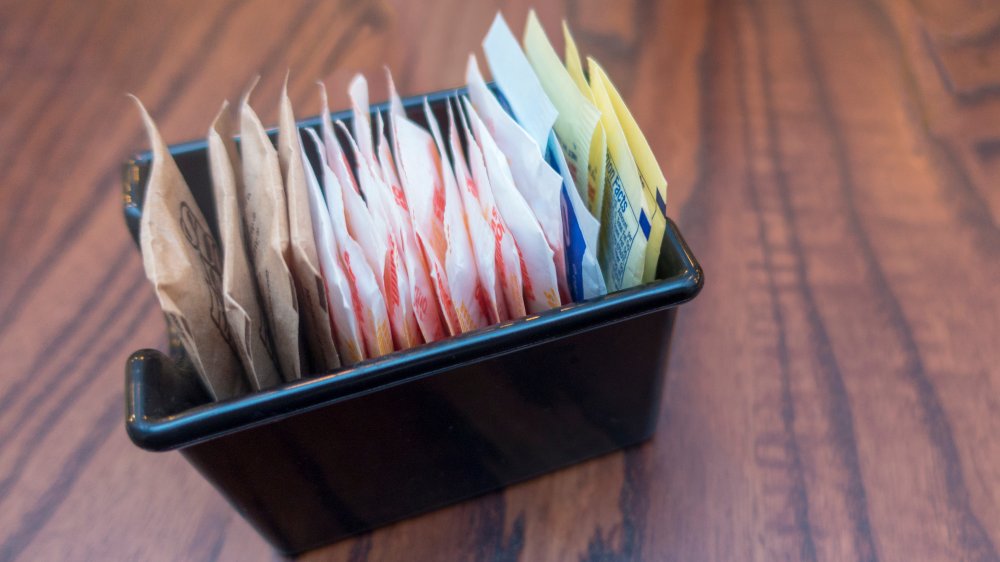Don't Even Try To Eat These Foods When You're Sick
There are some foods you may only eat when you're sick. Perhaps someone recommended the old adage "feed a cold, starve a fever" when you were feeling less than fabulous. However, you should take it with a grain of salt. This old wive's tale is totally bogus; you can and should eat regardless of your symptoms, as advised by the pros at Cedars Sinai.
Of course, not all foods are equally advisable when you are incapacitated for one reason or another. There are plenty of snacks, dishes, and drinks you should avoid entirely — or at least until you are on the way to feeling more like your healthy, happy self again. Naturally, your mid-illness menu may also depending on what you are experiencing. Some foods may be fine when you have the sniffles but awful when you have a stomach bug.
Want to know what you should skip when have a tension headache, sinus congestion, or a bout of nausea? Health Digest is breaking down all the do's and don'ts of your sick-day diet.
Skip the coffee if you're under the weather
The idea of giving up that ceremonial cup of coffee in the morning (and that afternoon latté) may make you want to cry. But if you've got the sniffles or a hacking cough, you might want to put down your favorite pick-me-up. Plus, if you are nauseous or having tummy troubles, the thought of espresso might make you gag.
Java junkies will want to steer clear of excessive coffee — and other caffeinated beverages and foods — when under the weather. As noted by Well+Good, caffeine is dehydrating. When you're sick, it's all that more important to stay hydrated. Additionally, coffee can mess with your ability to sleep — another thing that is essential to feeling better faster.
But, if you must have a few sips to feel remotely human, it won't be the end of the world. Nashville-based registered dietitian Jenny Beth Kroplin told Well+Good that coffee is full of "disease-fighting polyphenolic antioxidants" which can be "helpful to the body in healing from an illness." Of course, moderation is key, and you'll want to make sure you consume water, too.
Dairy is a major no-no when you have a cold
If you are congested, you should avoid dairy products. We're sorry to say that includes throat-soothing ice cream –although you probably can't taste it when you're stuffed up anyway!
While previous research has been unsuccessful at definitively making a direct connection between dairy and congestion, a 2018 study published in The Laryngoscope "found that a dairy‐free diet was associated with a significant reduction in self‐reported levels of nasopharyngeal secretions" in those who often complained about mucus congestion.
In addition to scientific evidence, many anecdotal reports show that consuming dairy products worsens a person's congestion. As noted by Verywell Health, this adverse reaction is common in those with a milk allergy. Those who don't have a specific allergy, on the other hand, may still find that eating or drinking dairy products while enduring the effects of a cold can "make phlegm feel worse because milk coats the mucus, making it feel thicker." Instead of gulping down some milk, meet your hydration needs with water.
Step away from the chocolate if you're having stomach issues
Feeling uncomfortably constipated? You are going to want to avoid that beloved chocolate bar, as recommended by CNN Health. And if the problem is diarrhea? You should still step away from the rich and creamy dessert indulgence; the caffeine in chocolate can make your tummy troubles worse and leave you dehydrated.
It's not all bad news for chocolate aficionados, though. As noted by Livestrong, chocolate comes from cocoa beans which are chock-full of the good-for-you antioxidants called polyphenols. These work to get rid of inflammation-causing free radicals that can lead to bad headaches. If you are prone to migraines, a few nibbles of dark chocolate might just be what the doctor ordered.
Furthermore, a bit of caffeine can also reduce inflammation to help ward off nagging headache pain. So enjoy — but in moderation. Excessive quantities of caffeine can make a headache even worse (via WebMD).
Fried and fatty comfort foods are a bad idea if you have these illnesses
When you are not feeling well, you might be more inclined to turn to comfort food — greasy, fatty, fried deliciousness. You'll likely enjoy it in the moment, but you will pay the price for that "happy meal" — especially if you have a stomach bug. Emory Professor Taz Bhatia told Men's Health that "fatty foods take longer to move through the digestive system, which can make nausea worse and trigger acid reflux." What's more, these unhealthy snacks and meals can cause muscle spasms in the intestinal tract further fueling diarrhea.
You should also avoid fried foods if you have a cold or viral infection. Lyssie Lakatos and Tammy Lakatos Shames (aka The Nutrition Twins) told Southern Living, "French fries [and other fried foods] cause inflammation in the body, unfavorably affect cholesterol levels and weaken the body, making it more difficult to fight the flu."
Wine, beer, and hard liquor will make you sicker
If you are feeling run down, you should abstain from that nightly glass (or two) of wine. While you are at it, avoid all alcoholic beverages until you are healthy and strong — and certainly skip any major benders. While you may be tempted to drink yourself into slumber, you wouldn't be doing yourself any favors.
As noted by the National Institute on Alcohol Abuse and Alcoholism, "Drinking too much can weaken your immune system, making your body a much easier target for disease." While this is certainly true of chronic alcohol abuse, it can also apply to one-off binge sessions as well. "Drinking a lot on a single occasion slows your body's ability to ward off infections — even up to 24 hours after getting drunk." So if your immune system is already taking a hit, give it time to rebound and recover. Furthermore, don't add insult to injury; a hangover is the last thing you'll want when you are already exhausted and ill.
If you have a headache, take a break from hot dogs and other highly processed foods
Got a pounding noggin? You should skip that hot dog, deli meat, or other highly processed foods for now, as suggested by Woman's Day. These foods are chock-full of nitrates which can alter the supply of oxygen in your bloodstream (a potential cause of headaches). Nitrates work to preserve food for longer and prevent the production of bacteria, per Healthline. They also give certain meats their pinkish color and add a salty flavor.
Your favorite frankfurters could be bad for your health in the longterm, too. As noted by Time, eating hot dogs and other processed meats up your odds of developing a few dangerous diseases, including heart disease, cancer, and type 2 diabetes. Research published in the International Journal of Cancer found that eating hot dogs, salami, and other assorted meats high in nitrate content significantly increased one's chances of getting bladder cancer. The study also found that a diet high in antioxidant-rich foods can potentially — at least somewhat — counter these negative effects. Nevertheless, those who eat a lot of processed meat are still at a higher risk.
Chinese takeout will probably make you feel worse, not better
If you think that an order of steamed pork dumplings and a pint of Wonton soup will turn your sick day around, you are sadly mistaken. Chinese take-out is on the list of foods you should avoid when you are feeling less than stellar. While having food delivered is encouraged when you're sick, Chinese food and soy sauce are both notoriously salty, as noted by Healthline. Foods high in sodium can drive up your blood pressure.
Even more important to note, though, is the potential for MSG (monosodium glutamate) in your soy sauce and favorite dish. This is a problem if you are someone who gets migraines. As WebMD explained, "the main ingredient in soy sauce and meat tenderizer, MSG can spark a migraine within 20 minutes." Furthermore, as indicated by Health, "greasy, spicy, or oily foods," (three things Chinese food dishes often are) can cause — or in the case of illness — exacerbate nausea.
Sweets and sugary treats may comfort you, but they can also prolong your illness
If you have a cold or cough, you may want to limit your intake of refined sugar and sweet treats. As noted by Livestrong, while many studies have failed to conclusively link sugar to a weakening of the immune system, "anecdotal evidence" has found that "eating sugar when you have a cold may worsen your symptoms." The site continued, "Sugar is thought to suppress immune function and affect your body's ability to fight germs and recover from diseases." Furthermore, as indicated by a study in the Journal of the American Medical Association, sugar can cause inflammation which can then lead to a negative immune reaction.
Internist Kristine Arthur told Prevention that refined sugar "can temporarily suppress your white blood cells' ability to fight off bacteria" — a reaction you definitely don't want when you're trying to recover quickly from being sick. So maybe skip the cookies or donuts next time you have the sniffles. And, if you really need a sugar fix, consider turning to fruits that are high in vitamin C like pineapple, strawberries, or papaya, as recommended by Livestrong. Another sweet way to feel better? Have some honey — a teaspoon or two can help with that hacking nighttime cough, per the Mayo Clinic.
Believe it or not orange juice isn't helping your sore throat
If it has been drilled into your head that orange juice is the answer to the first sign of a cold, it's time to learn the counter argument. While orange juice is, in fact, full of good for you immune-boosting vitamin C, it is also loaded with sugar (via Healthline). That sugar content isn't very good for you when you're battling an illness.
What is more, Dr. Taz Bhatia, a professor at Emory University, told Prevention that orange juice "contains citric acid, which irritates the lining of your already-inflamed throat.' It can also be abrasive on a sore stomach and digestive tract, as noted by Livestrong. A low-acid orange juice might help, but won't necessarily solve any juice-induced tummy troubles. Still, drinking orange juice has some definite pros that can't be ignored; it has lots of beneficial nutrients and inflammation-fighting antioxidants, per Healthline.
Just say no to canned soup when you're feeling sick
Nothing says "get well soon" like a warm bowl of chicken noodle soup. But don't run to open up a Campbell's can. Instead, you might want to consider ordering the ingredients to make your own pot from scratch.
Registered dietitian Lauren Papanos told Insider that canned soup is loaded with sodium. As such, she suggested making your own without the use of excessive salt. Chef and author Devin Alexander echoed this notion in an article on Healthline: "Don't be fooled. Chicken noodle soup is often not healthy and anyone with high blood pressure needs to be particularly careful." As noted by Health Central, when you are sick it is common to see a rise in blood pressure. Hence it's important to be mindful of sodium levels in the food you eat.
As for other soups? Try to stick with something light. Creamy or cheesy soups might thicken mucus. Plus, the high level of fat can make hearty options more difficult to digest (via The Daily Meal).
Ginger ale or soda may make your stomach feel worse
Is ginger ale your go-to for nausea or an upset stomach? It's true that those little bubbles can help make your tummy feel a bit more settled, but a lot of that reaction might be in your head, as indicated by The Wall Street Journal. Oftentimes, soda actually does more harm than good in response to tummy troubles. The carbon dioxide in these beverages can get trapped in your stomach leading to bloating. And if you have acid reflux or gastroesophageal reflux disease (GERD), carbonation can cause more acid production that hurts your stomach's lining (via Livestrong).
Of course, most sodas are also loaded with sugar. In an article on Theraflu's site, Dr. Kathleen Dass of the Michigan Allergy, Asthma, and Immunology Center stressed that it's key to drink up when you are sick, but important to "steer clear of sugary options." She elaborated that it is "best to avoid drinks that act as diuretics because these will dehydrate you. Caffeinated beverages such as coffee, tea, soda pop, and alcohol are leading culprits." When in doubt, stick with good old-fashioned H20.
Spicy foods can help or hurt depending on your sickness
It is true that some spicy foods — like cayenne pepper — could actually help clear congestion. As explained by UCLA Health, "capsaicin, the active compound in cayenne peppers, may thin the mucus and stimulate the sinuses aiding in air circulation." But there is a flip side to this possibility — with other people reporting the complete opposite reaction. Some studies have shown that certain spicy foods can actually trigger sneezing attacks.
If you have or are recovering from a stomach bug, though, spicy food should definitely stay off your menu. Registered dietitian Sheri Kasper told Shape that "highly acidic (tomatoes, for example) or spicy/boldly spiced foods can also trigger nausea or stomach pain, so they should be approached with caution." No Fra Diavolo sauce until you are fully on the mend. Stick to the bland stuff: toast, rice, apple sauce, and fluids.
Stay away from raw veggies when you have a tummy ache
If it is a gastrointestinal illness you are dealing with, you might want to skip the big salad or crudité platter. Raw vegetables are hard for your system to process, as noted by Mind Body Green: "You can chew and chew, but cold, raw food can upset the digestion, especially when it already isn't working at optimum capacity." The site explained, "Raw vegetables can simply be hard to digest. Anybody with irritable bowel syndrome knows this."
That doesn't mean you should avoid vegetables altogether, though. A rainbow of produce contains vitamins, nutrients, and inflammation-fighting antioxidants, which can help bolster your immune system as noted by St. John's Health. To avoid any potential stomach discomfort, though, consider poaching, steaming, or sautéing your veggies, as this can help make them easier to digest and thus gentler on your irritated tummy.
Anything with artificial sweeteners may worsen diarrhea
It's true that excessive refined sugar isn't advisable when you're not feeling so great. But what about the fake stuff? Could options like aspartame, saccharrin, sucralose, and sugar alcohols be a sick-day alternative? Well, the short answer is probably not. Artificial sweeteners are commonly known to "upset the digestive system," as explained by Healthline.
Additionally, they can even act as a laxative. So much so, in fact, that "some foods that contain them have a label warning about their potential laxative effect," Healthline revealed. If diarrhea is already among your unpleasant symptoms, you're definitely going to want to steer clear of these offensive ingredients. And sugar alcohols, including mannitol and sorbitol, are not much better. These items tend to have a similar effect, and can cause both diarrhea and gas. So, let's be really clear here: You will want to avoid diet sodas and even some chewing gums while under the weather. And when it doubt? Check a food or drink's label to make sure your goodie doesn't have these ingredients.

